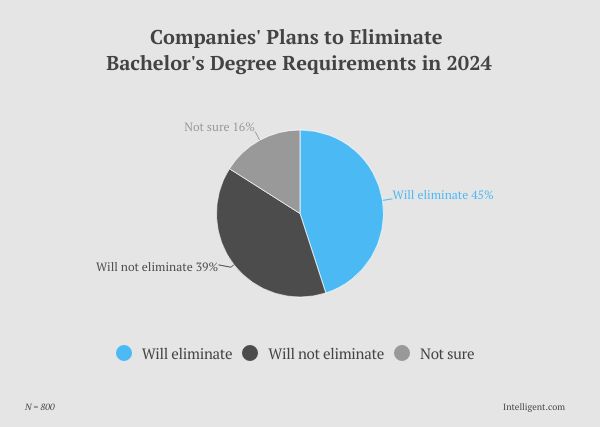In recent years, more and more companies are eliminating degree requirements in their hiring processes. This shift toward skills-based hiring is reshaping the job market and creating a more diverse and inclusive workforce. Here’s a look at the impact of this trend and what it means for employers and job seekers alike.
Why Eliminate Degree Requirements?
1. Expanding Talent Pools: Removing degree requirements opens the door to a wider range of candidates, many of whom possess valuable skills and experience but may not have a formal degree. This approach recognizes that skills and competencies can be acquired through non-traditional paths, such as online courses, vocational training, or on-the-job experience.
2. Enhancing Diversity and Inclusion: Degree requirements can unintentionally perpetuate social and racial inequalities. By focusing on skills rather than credentials, companies can attract candidates from diverse backgrounds, including those who may not have had the financial means or opportunity to pursue higher education.
3. Addressing Skills Gaps: In fast-evolving industries, the skills needed for certain roles can change rapidly. Skills-based hiring ensures that candidates have the up-to-date expertise needed for success, regardless of their educational background.
Benefits for Employers
1. Increased Innovation and Performance: Diverse teams bring a variety of perspectives and ideas, which can drive innovation and improve problem-solving. Companies that hire based on skills rather than degrees often find that their teams are more dynamic and effective.
2. Better Alignment with Business Needs: By identifying the specific skills required for a role, employers can ensure that candidates are well-suited to meet their needs. This can lead to improved job performance and employee satisfaction.
3. Reduced Turnover Rates: Employees who are hired based on their skills and fit within the company culture are more likely to feel valued and stay longer, reducing turnover rates and associated hiring costs.

Image Source: tradeandindustrydev.com
Challenges and Considerations
1. Changing Mindsets: Transitioning to skills-based hiring requires a shift in mindset for many employers. It involves re-evaluating job descriptions, interviewing techniques, and assessment methods to focus on practical skills rather than academic achievements.
2. Ensuring Fair Assessment: Implementing fair and effective skills assessments is crucial. Employers need to design tests and evaluation processes that accurately measure candidates’ abilities without introducing bias.
3. Overcoming Institutional Barriers: Some industries have entrenched norms regarding educational requirements, and changing these can be challenging. Companies need to balance the need for professional credentials with the benefits of a more inclusive approach.
Conclusion
Eliminating degree requirements in favor of skills-based hiring offers numerous advantages for both employers and job seekers. By focusing on what candidates can do rather than where they studied, companies can create more inclusive, innovative, and effective teams. As more organizations embrace this trend, it has the potential to transform the workforce and promote greater equity and opportunity for all.
By reevaluating traditional hiring practices, businesses can tap into a broader talent pool and set the stage for future success in an increasingly competitive market.




























